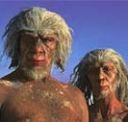|
.
Evolutionary Psychology mind and behaviour |
|
|
|
The human mind: A savannah mind.
It
is during
the Pleistocene epoch that modern humans finally evolved from their
hominid and primate forebears
(200,000 years BP). An often used moniker for the modern human mind
is the “stone age” mind. This conjures images of “caveman”
hunter & gathers battling the ice-age elements and avoiding
dangerous predators. However it is believed that modern
humans had their genesis within the more benign savannah environments
of East Africa (Evans & Zarate, p. 45) and then moved out of
Africa as early as 100,000 years BP. (Howe, 2003, p. 63).
So rather than a “stone-age mind”, it might more accurate to describe the modern human mind as fundamentally being a “savannah mind” Predator-detection module: An example of a module adapted to life on East African savannah.
Early
humans
were at great risk from predators. As a result humans have developed
a predator-detection module
which rapidly alerts us to any dangerous
predator and initiates the well-known fight/flight or freeze
reactions - which help protect us from danger. However these fear mechanisms also use up valuable resources. So in order to conserve these resources, a second module determines whether to continue the fear mechanisms. The module assesses this by 'using' its internal algorithm (and drawing from its knowledge database) to calculate whether the original 'scare' was actually a threat. If the 'scare' turns out to be a false alarm, then the second-module will override the first predator-detection module and close down the fear mechanisms (Evans & Zarate, pp.54-55). |
|














